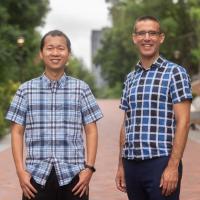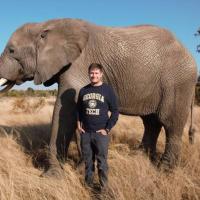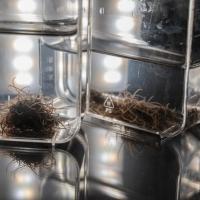News

Joshua Weitz, School of Biological Sciences professor and Tom and Marie Patton Chair heads to France to hold Blaise Pascal International Chair of Excellence, continue virus research, and teach.

Researchers are working to develop simple, low-cost, legged robots capable of linking and unlinking to accomplish tasks, such as gap traversal, stair climbing, and object transport over uneven terrains.

A team of interdisciplinary scientists from Georgia Tech led by Brian Hammer has found a previously unknown tool in the arsenal of cholera bacterium — a toxin that impairs a cell’s overall membrane and looks like none described prior.
Eric Schumacher, professor in the School of Psychology, teaches that, with intentional practice, people can improve their happiness level regardless of the circumstances and their individual predisposition.

Traffic and wind regularly cause low frequency vibrations to ripple through bridge building materials such as steel and concrete. This energy would normally travel away from its source before dissipating — but School of Mathematics' Rachel Kuske…

The NIH-funded program is designed to train a new generation of biomedical researchers and thought leaders to harness the data revolution.
We’ve seen robots take to the air, dive beneath the waves, and perform all sorts of maneuvers on land. Now, physicists at Georgia Tech and engineers at UC Santa Barbara are exploring the shallow underground world with a fast, steerable, burrowing…

SPRUCE experiment study shows elevated levels of greenhouse gases emerging from carbon-rich peatlands

New research from Georgia Tech finds that elephants dilate their nostrils in order to create more space in their trunks, allowing them to store up to 5.5 liters of water. They can also suck up three liters per second — a speed 30 times faster…

School of Biological Sciences’ Jeffrey Skolnick and Hongyi Zhou are part of an award-winning NIH effort to create innovative, AI-powered platforms for discovering new pain management drugs — and identify immediate solutions.

Despite a long-held hypothesis that oxygen determined the size of large, complex multicellular organisms during the early Earth, researchers have found the early rise in global oxygen, should have, “in fact strongly constrain[ed] the…

Inspired by a theoretical model of particles moving around on a chessboard, new robot swarm research led by Georgia Tech shows that, as magnetic interactions increase, dispersed “dumb robots” can abruptly gather in large, compact clusters to…

The world's oceans are made up of various "ecoregions," but experts have had trouble connecting them. A new look at existing satellite data by researchers from the School of Earth and Atmospheric Sciences could provide a new way to link those…

Julia Kubanek, professor of biological sciences and chemistry and biochemistry, and associate dean for Research in Georgia Tech’s College of Sciences, has been named vice president for Interdisciplinary Research, effective July 1.

It's one of the most important processes for the development of the human brain, but science is still learning about DNA methylation. A School of Biological Sciences professor and her research team have uncovered some new information about how…

In celebration of Women's History Month, Georgia Tech highlights the onward and upward trajectory of nine women across campus who are shattering the traditional "glass ceiling" — carving a path for others and for equitable recognition, respect,…

Stony Coral Tissue Loss Disease is ravaging Florida's coral reefs, with 20 out of 45 coral species in the state's waters already infected. School of Chemistry and Biochemistry assistant professor Neha Garg has received an NSF CAREER…

A new study reported by Georgia Tech researchers finds that an alligator heart will not fibrillate when exposed to drastic temperature changes, unlike a rabbit (mammal) heart, which is critically vulnerable to heart trauma under those conditions…

Individually, California blackworms live an unremarkable life eating microorganisms in ponds and serving as tropical fish food for aquarium enthusiasts. But together, tens, hundreds, or thousands of the centimeter-long creatures can collaborate…

He's a physicist, but Flavio Fenton has long been fascinated by the heart, and the electrical signals that keep it pumping. Fenton recounts how he pivoted from particle physics to researching cardiac rhythms, along the way helping to provide…